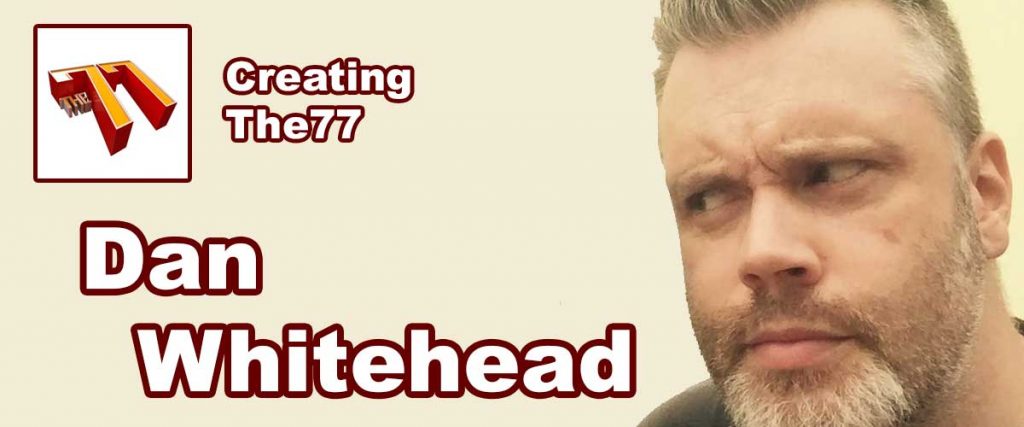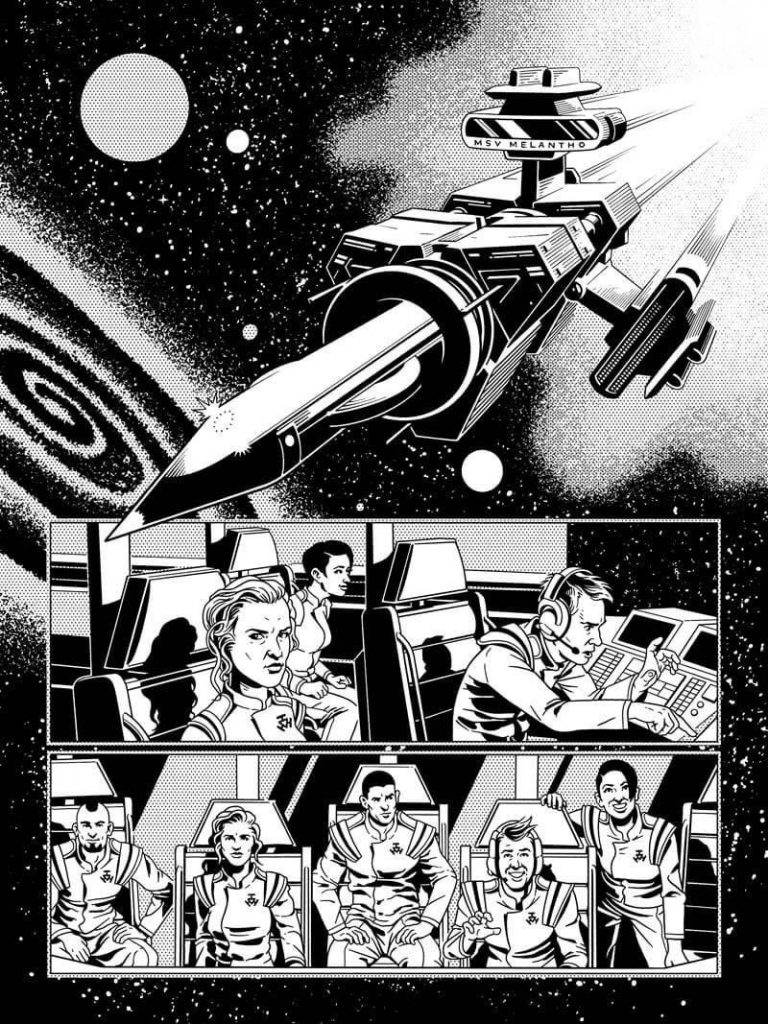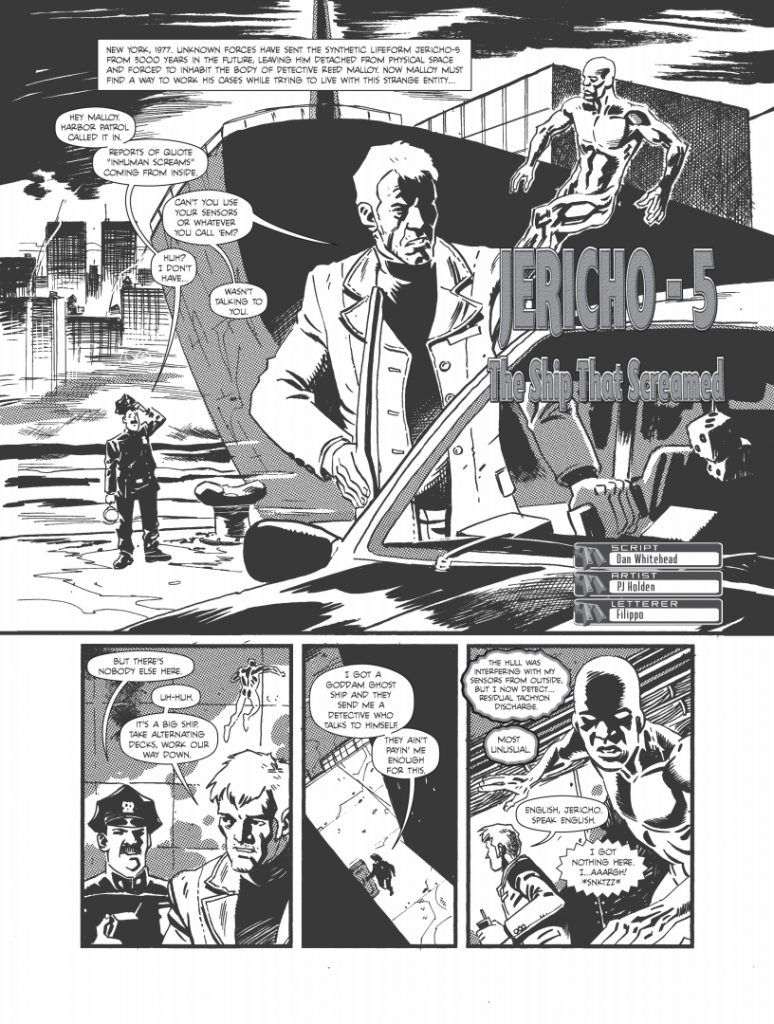
The77 – The Summer Special features a great range of strips from a wide range of comic creators, and we’re thrilled to present, a series of tie-in “Meet the Creator” interviews conducted by Morgan Spiceman with the writers and artists involved in the project.
This time out, it’s a quick chat with Dan Whitehead, a writer based in the dystopian urban hellscape of (checks map)… South Manchester. He’s been writing for money since the 1990s and nobody has told him to stop yet. Or if they have, he didn’t listen to them…
What is The77?
It’s at the vanguard of a new wave of British indie comic anthologies that really seem to have exploded this year. I’m always wary of nostalgia when it comes to this sort of thing, but I do believe a return to the short, punchy, focused storytelling that classic British comics offered is a healthy and useful thing – for us as creators, as well as readers.
How did you get involved?
I backed the first issue and loved it, and when I saw they were looking for pitches for the second issue I thought I’d throw my hat in the ring.

What is your story about?
I actually have two strips in the second issue. “Gut Crawlers”, with Paul Williams, is the one I originally pitched. It’s about the crew of an unlicensed ship that prowls space looking for ketozoa, gigantic space whales that have helium-3 crystals forming in their guts from the cosmic debris they feed on. Those crystals are essential to fusion drive propulsion, so a thriving black market springs up around their extraction.
The other strip is “Jericho-5”, with PJ Holden, about a New York cop in 1977 and the artificial lifeform from 3000 years into the future that only he can see. Think Starsky & Hutch with a gonzo sci-fi twist.
Who are the characters?
In “Gut Crawlers”, the characters are the crew of the MSV Melantho, led by Captain Colley, a hard-bitten lifelong gut crawler. Their navigator and “puncturist” is Griz, while the away team who actually venture into the guts of the ketozoa and do the messy work are Hezal, stoic and dedicated, Buechler, tough and cranky, and Mela, the new recruit who shakes things up.
In “Jericho-5”, we meet Detective Reed Malloy, whose regular beat is complicated by the presence of Jericho-5, an artificial lifeform from 3000 years in the future who gets dislocated in time and ends up bonded to Malloy in order to survive. It’s a classic buddy cop set-up, with Malloy the world-weary seen-it-all cop who bends the rules, and Jericho as the analytical brainbox.
Where did you get the idea for the stories?
“Gut Crawlers” came about because I knew The77 was looking for hard sci-fi pitches, so immediately my thoughts went to Alien and the idea of a small crew on a functional ship, traveling through space.
I wanted them to have a blue collar feel, and so the idea of whalers in space popped into my head.
It’s a two-parter, setting up the concept, with the second part in Issue 3.

“Jericho-5” was PJ’s idea, so you’d have to ask him where it came from! We worked together on a comic I did based on the old video game Midwinter, and he emailed to ask me if I’d help develop his “Jericho-5” story into a script.
What are your hopes for The77?
I’d love for it to keep going, obviously! It has a great mixture of established and emerging talent, and I think the UK indie scene can really use anthologies like this to showcase the talent that’s out there.
How long have you been writing?
I got my first job writing for games magazines in 1991, when I’d just finished my A-Levels and I’ve been lucky enough to keep getting paid to write stuff ever since. I’ve worked on licensed books and comics – Star Wars, Lord of the Rings, Looney Tunes and more, written for TV and done scripts for video games, and even get to interview celebrities for magazines.
Comics is the medium I come back to for maximum fun and satisfaction though.
Who are your favourite writers?
HG Wells was the first author that I really got fanboyish about as a kid. Shirley Jackson is another – The Haunting of Hill House is far stranger and more intriguing as a novel than any of the filmed versions.
An obvious and obligatory answer, but Alan Moore’s ability to straddle pulp and profundity always impresses and inspires me.
What are your favourite comics?
Too many to list really! The ones that had the biggest influence were titles like Eagle, 2000AD, Scream and Oink in the 1980s.
Tank Girl, Love & Rockets, Milk & Cheese were all favourites as a teenager. It’s no coincidence they all appeared in Deadline, which was formative for me in terms of tying comics into pop culture in general, and broadening my appreciation of what comics could be.
What are your influences?
Apart from the ones mentioned above, I try to be open to anything and everything. Good ideas can come from the least likely places, so I try not to just consume books and films and things that I already know. Watching some random documentary or reading a history book are more likely to trigger an interesting seed of an idea than endlessly re-consuming the same stuff over and over.
What characters would you love to write?
I seem to be drawn to characters with very fluid backstories, the ones that are open to reinvention and reinterpretation. I’d love to write a Godzilla comic, for example, and have a killer pitch for a crossover that will never ever happen.
Freddy Krueger is another I’d love to bring back in comics form somewhere. I believe the Elm Street rights have now reverted back to Wes Craven’s estate, so I may try a speculative email or two…
Who would you like to work with?
This is always a loaded question, as I’m sure to leave people out. I’m honestly just thrilled to collaborate with the people I’ve worked with and am always excited to meet new artists and see if their style triggers ideas for me.
What advice would you have for upcoming writers?
Persistence is more useful than perfection. Coming up through monthly magazines was a good training ground, I think, as you could never afford to be precious about what you were working on. You’d get it as good as you could, but deadlines force you to let it go and move on to the next thing.
Without that, it’s easy to get trapped in a cycle of anxiety about whether a piece is good enough, and sometimes you just have to trust that you’ve given it everything you can and put it out into the world. Building that muscle memory of starting an idea, seeing through, and getting it finished is one of the most important skills you can have as a writer.
Not everything you do will be great – or even good – but the more you do it, the more you’ll see an upward curve in your confidence and skill.
Dan, thank you very much for your time and the very best of luck with future projects!
Dan is online at www.danwhitehead.net | Facebook | Twitter
The founder of downthetubes, which he established in 1998. John works as a comics and magazine editor, writer, and on promotional work for the Lakes International Comic Art Festival. He is currently editor of Star Trek Explorer, published by Titan – his third tour of duty on the title originally titled Star Trek Magazine.
Working in British comics publishing since the 1980s, his credits include editor of titles such as Doctor Who Magazine, Babylon 5 Magazine, and more. He also edited the comics anthology STRIP Magazine and edited several audio comics for ROK Comics. He has also edited several comic collections, including volumes of “Charley’s War” and “Dan Dare”.
He’s the writer of “Pilgrim: Secrets and Lies” for B7 Comics; “Crucible”, a creator-owned project with 2000AD artist Smuzz; and “Death Duty” and “Skow Dogs” with Dave Hailwood.
Categories: British Comics, Comic Creator Interviews, Creating Comics, downthetubes Comics News, downthetubes News, Features
 The SEQUENT’ULL Interviews: Dan White
The SEQUENT’ULL Interviews: Dan White  The SEQUENT’ULL Interviews: Michelle Freeman
The SEQUENT’ULL Interviews: Michelle Freeman  The SEQUENT’ULL Interviews: Colossive Press
The SEQUENT’ULL Interviews: Colossive Press  Crowdfunding Spotlight: Who Killed Nessie? A Quick Chat with Paul Cornell & Rachael Smith
Crowdfunding Spotlight: Who Killed Nessie? A Quick Chat with Paul Cornell & Rachael Smith